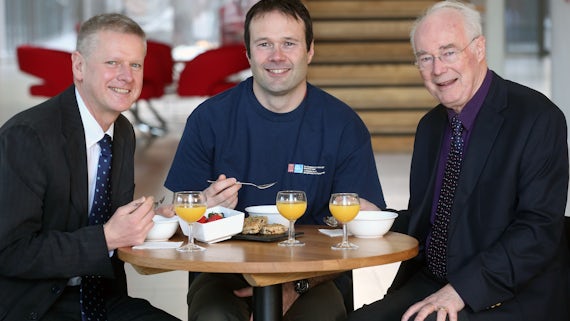32% of all cancer may be avoidable by changes in diet
26 Chwefror 2015

The European Cancer Stem Cell Research Institute marked World Cancer Day on 4 February by hosting a healthy breakfast event in support of one of the themes of the international awareness day – choosing a healthier lifestyle. On a day when the world's population united in the fight against the disease, bowel cancer expert Dr Lee Parry encouraged staff within the University to start their day in a healthier way.
Dr Parry's research interests, which are supported by the World Cancer Research Fund and Tenovus, lie in understanding the interactions that link diet to cancer - his message at the event was simple:- "Considering recent evidence, it is roughly estimated that about 32% of all cancer may be avoidable by changes in diet particularly in bowel cancer," he said. "Whereas earlier thinking about nutrition and cancer emphasized the adverse effects of fat and other components in the diet, the most compelling evidence of the last decade has indicated the importance of protective factors, largely unidentified, in fruits and vegetables. Further, the importance of the interaction between the diet and gut bacteria has also been identified, as typical "western diets" can lead to inflammation that predisposes to bowel cancer."
Dr Parry's advice was to think about diet, and make small changes for the better. "At the end of the day, I would advocate everything in moderation," he added. "So, swapping the cooked breakfast for a healthier alternative more often will help to reduce the risk of developing some forms of cancer. I wouldn't deny myself a bacon buttie every now and again, but balance it with nutritious foods such as muesli and fruit and you'll notice a great difference in yourself."
World Cancer Day's message was that cancer is 'Not Beyond Us', with four themes being highlighted during the campaign.
◗ Choosing a healthier lifestyle
◗ Delivering early detection
◗ Achieving treatment for all
◗ Maximising quality of life
All of these themes mirror the aims of the Institute, so it was appropriate to show support. The breakfast had a 'healthy' turnout which included the University's Vice Chancellor Professor Colin Riordan and Chancellor Professor Sir Martin Evans, who won a Nobel Prize for Medicine in 2007 for his research into embryonic stem cells.